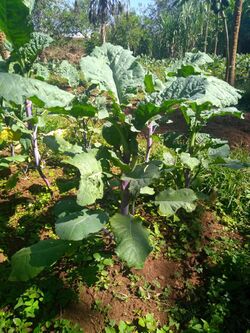Biology:Brassica carinata
| Brassica carinata | |
|---|---|

| |
| Scientific classification | |
| Kingdom: | Plantae |
| Clade: | Tracheophytes |
| Clade: | Angiosperms |
| Clade: | Eudicots |
| Clade: | Rosids |
| Order: | Brassicales |
| Family: | Brassicaceae |
| Genus: | Brassica |
| Species: | B. carinata
|
| Binomial name | |
| Brassica carinata A.Braun
| |
| Synonyms[1] | |
|
Brassica timoriana F.Muell. | |
Brassica carinata is a species of flowering plant in the Brassicaceae family.[1][2] It is referred to by the common names Ethiopian rape or Ethiopian mustard.[3] It is believed to be a hybrid between Brassica nigra and Brassica oleracea.[4]
The flowers attract honey bees to collect pollen and nectar.
Leaf uses
The plant has a mild flavor, and is eaten as a leaf vegetable. It is known as (Template:Lang-om); habesha gomen, (Amharic: ሐበሻ ጎመን).[5] Named varieties include Texsel, which is particularly adapted to temperate climates.[6] Cultivation of Ethiopia mustard as leaf vegetable is limited to small-scale production but it is slowly gaining popularity in rural as well as urban areas where commercial production is taking place.[7]
Seed uses
Although Brassica carinata is cultivated as an oilseed crop in Ethiopia,[8] it has high levels of undesirable glucosinolates and erucic acid.[9] The closely related Brassica napus (rapeseed) is considered a better oilseed crop in comparison.
Brassica carinata has been used to develop an aviation biofuel for jet engines.[10] On October 29, 2012, the first flight of a jet aircraft powered completely by biofuel, made from Brassica carinata, was completed.[11][12] The byproduct of Brassica carinata oil production is utilized in protein meal for animal fodder.[13]
Industrial application
The oil quality profile includes a high percentage of erucic acid (40–45 %) making it highly desirable as a biofuel and for industrial applications such as production of plastics, lubricants, paints, leather tanning, soaps, and cosmetics.[14]
References
- ↑ 1.0 1.1 "Brassica carinata A.Braun". The Trustees of the Royal Botanic Gardens, Kew. n.d.. https://powo.science.kew.org/taxon/urn:lsid:ipni.org:names:279278-1.
- ↑ "Brassica carinata A.Braun". The World Flora Online Consortium. n.d.. http://www.worldfloraonline.org/taxon/wfo-0000570995.
- ↑ (xls) BSBI List 2007, Botanical Society of Britain and Ireland, https://bsbi.org/download/3542/, retrieved 2014-10-17
- ↑ Prakash, S. and Hinata, K. (1980), "Taxonomy, cytogenetics and origin of crop Brassicas, a review", Opera Botanica, 55:1-57
- ↑ Zemede Asfaw, "Conservation and use of traditional vegetables in Ethiopia" , Proceedings of the IPGRI International Workshop on Genetic Resources of Traditional Vegetables in Africa (Nairobi, 29–31 August 1995)
- ↑ Plants for a Future (2008-06-10). "Brassica carinata". http://www.pfaf.org/database/plants.php?Brassica+carinata.
- ↑ Bihn, Elizabeth A.; Reiners, Stephen (2018-02-16), "Good Agricultural Practices and Good Manufacturing Practices for Vegetable Production", Handbook of Vegetables and Vegetable Processing (Chichester, UK: John Wiley & Sons, Ltd): pp. 109–134, doi:10.1002/9781119098935.ch5, ISBN 978-1-119-09893-5, http://dx.doi.org/10.1002/9781119098935.ch5, retrieved 2020-09-29
- ↑ Alemaheyu, N. and Becker, H. (2002), "Genotypic diversity and patterns of variation in a germplasm material of Ethiopian mustard (Brassica carinata A. Braun)", Genetic Resources and Crop Evolution, 49(6):573-582
- ↑ Getinet, A., Rakow, G., Raney, J. P. and Downey, R. K.(1997) "Glucosinolate content in interspecific crosses of Brassica carinata with B. juncea and B. napus", Plant Breeding 116 (1):39–46
- ↑ Lane, James (18 April 2012), "Tinker, tailor, sailor, fly", BioFuels Digest, http://www.biofuelsdigest.com/bdigest/2012/04/18/tinker-tailor-soldier-fly-aviation-biofuels-advance-attract-opponents-over-costs/, retrieved 31 January 2015
- ↑ "First solely-biofuel jet flight raises clean travel hopes". http://www.asdnews.com/news-46032/First_solely-biofuel_jet_flight_raises_clean_travel_hopes.htm.
- ↑ "NRC Flies World's First Civil Jet Powered by 100 Percent Biofuel". Aero-news Network. 7 November 2012. http://www.aero-news.net/index.cfm?do=main.textpost&id=a3309cef-59ee-4742-8f24-bb7d39a86cf8. Retrieved 21 November 2012.
- ↑ Pratt, Sean (11 May 2017). "Firm eager to ride the 'canola train' with carinata". The Western Producer. https://www.producer.com/2017/05/firm-eager-to-ride-the-canola-train-with-carinata/. Retrieved 29 January 2018.
- ↑ Kumar, Shivendra; Seepaul, Ramdeo; Mulvaney, Michael J.; Colvin, Blaire; George, Sheeja; Marois, Jim J.; Bennett, Rick; Leon, Ramon et al. (August 2020). "Brassica carinata genotypes demonstrate potential as a winter biofuel crop in South East United States" (in en). Industrial Crops and Products 150: 112353. doi:10.1016/j.indcrop.2020.112353.
Wikidata ☰ Q1455929 entry
 |

